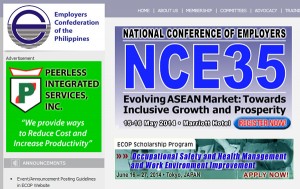MANILA, Philippines—To better prepare for the opportunities and challenges that the Asean economic integration will bring to the labor sector, the country’s largest group of employers has reiterated the business sector’s call to remove the restrictions on foreign investors.
The 35th National Conference of Employers’ resolutions presented by the Employers’ Confederation of the Philippines (ECOP) to House Speaker Feliciano “Sonny” R. Belmonte Jr. on Friday included the group’s call to “rationalize investment incentives and review foreign equity requirements to encourage the entry of foreign investors.”
In an interview, ECOP president Edgardo G. Lacson said employers have been one with local and foreign business chambers in pushing for opening up restricted investment areas such as banking, media, and retail, among others.
ECOP also wants foreigners to be allowed to control up to 100 percent of their businesses in the country, as well as own land, according to Lacson.
Such can be done through Charter change, Lacson said, but he clarified that only the economic restrictions should be amended.
Lacson said the Philippine economy should be opened up to attract investments as competition would further intensify among Asean members, especially during the integration of the region as a single production base and market by 2015.
An influx of investments into the country would generate more jobs, he pointed out.
In light of the Asean integration, ECOP is also pushing for revisiting the antiquated Labor Code so it would be “consistent with the changes in the way business and employment relations are carried out in the 21st century.”
In particular, ECOP wants a revised Labor Code that will reduce rigidity in hiring, engagement and termination of employees; de-policitize minimum wage determination; and enhance labor justice administration through swift, equitable and quality decisions in cases brought for voluntary arbitration.
The Labor Code should also be amended to promote conciliation, mediation and voluntary arbitration in resolving disputes, as well as de-criminalize labor laws “by limiting liabilities to civil aspect and removing imprisonment as a form of penalty,” according to ECOP.
The group’s wish list included same-old concerns, such as poor infrastructure, skills gap, and lack of financial assistance for training and capacity building.
